Key takeaways:
- Capital punishment raises moral questions about justice, the value of human life, and the risks of wrongful convictions.
- Arguments against the death penalty include its ineffectiveness as a crime deterrent and its disproportionate application based on race and socioeconomic status.
- Alternatives to capital punishment, such as life imprisonment, restorative justice, and community service, focus on rehabilitation and healing rather than retribution.
- Advocacy for anti-death penalty measures highlights systemic inequalities and the financial burdens of capital punishment compared to life sentences.
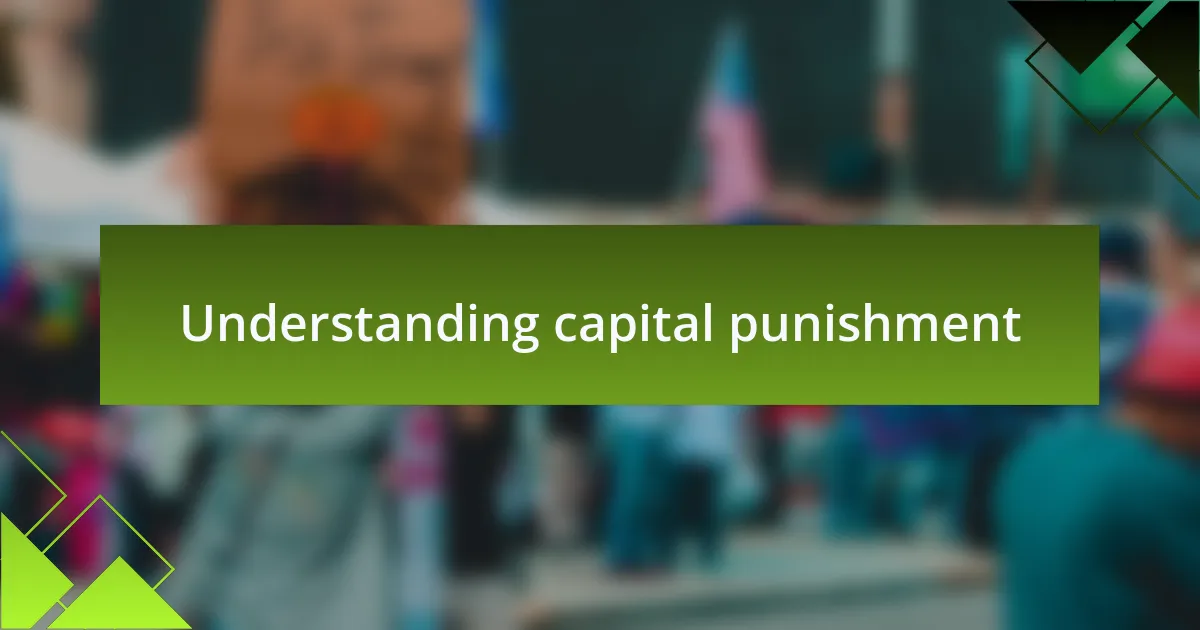
Understanding capital punishment
Capital punishment, often referred to as the death penalty, is a legal process where a person is executed by the state as a punishment for a crime. I often wonder how society defines justice when the state takes a life. Considering my experiences with individuals affected by violent crimes, I can’t help but feel that the complexities of human emotion and morality go far beyond a simple penalty.
The rationale behind capital punishment typically rests on deterrence, retribution, and justice. However, I frequently reflect on whether inflicting such irreversible harm truly deters crime or brings solace to victims’ families. I’ve spoken with survivors of violent crimes who grapple with conflicting emotions; they seek justice but question whether ending a life can ever truly restore peace.
When I think about the broader implications of capital punishment, I find myself questioning its moral standing in a society that values human rights. It pains me to consider that errors can lead to the execution of innocent people, a reality that some might dismiss as an unfortunate statistic. How do we reconcile the idea of a fair justice system with the potential for such irrevocable mistakes? For me, these questions highlight a moral ambiguity that cannot be overlooked.
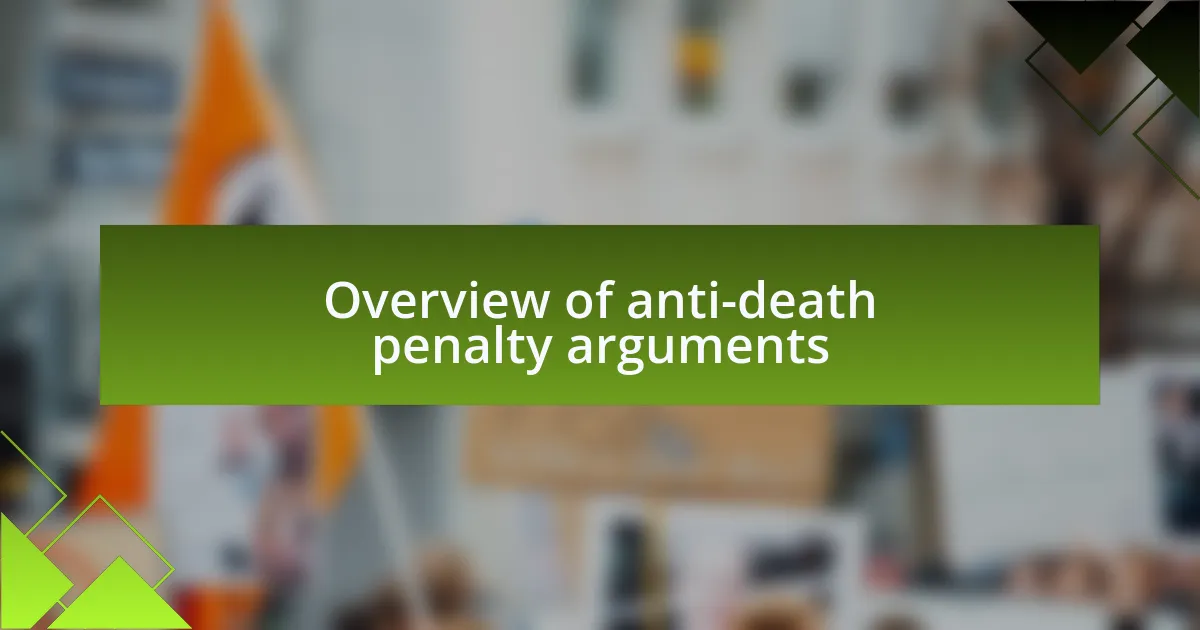
Overview of anti-death penalty arguments
Arguments against capital punishment often center around the inherent risk of executing the innocent. I can’t help but recall a documentary I watched about a man who spent decades on death row for a crime he didn’t commit. How does society reconcile that loss, not just of life, but of all the years and experiences taken from him? It raises profound questions about the reliability of our justice system.
Additionally, many argue that the death penalty does not serve as an effective deterrent to crime. From what I’ve seen in discussions with law enforcement officials, the reality is that most violent crimes are committed in the heat of the moment, without premeditated thought of consequences. So, can we genuinely claim that a death sentence dissuades potential offenders? It seems that the evidence simply doesn’t support this claim.
Another key argument against capital punishment is its disproportionate application based on race and socioeconomic status. This stark reality has been illuminated in countless studies, igniting passionate debates among advocates for justice. Personally, I’ve attended community forums where stories were shared about how individuals from marginalized backgrounds face harsher penalties. Is it fair that one’s life can hinge on factors like race or wealth? I believe this inequity challenges the very foundation of what we define as justice in our society.
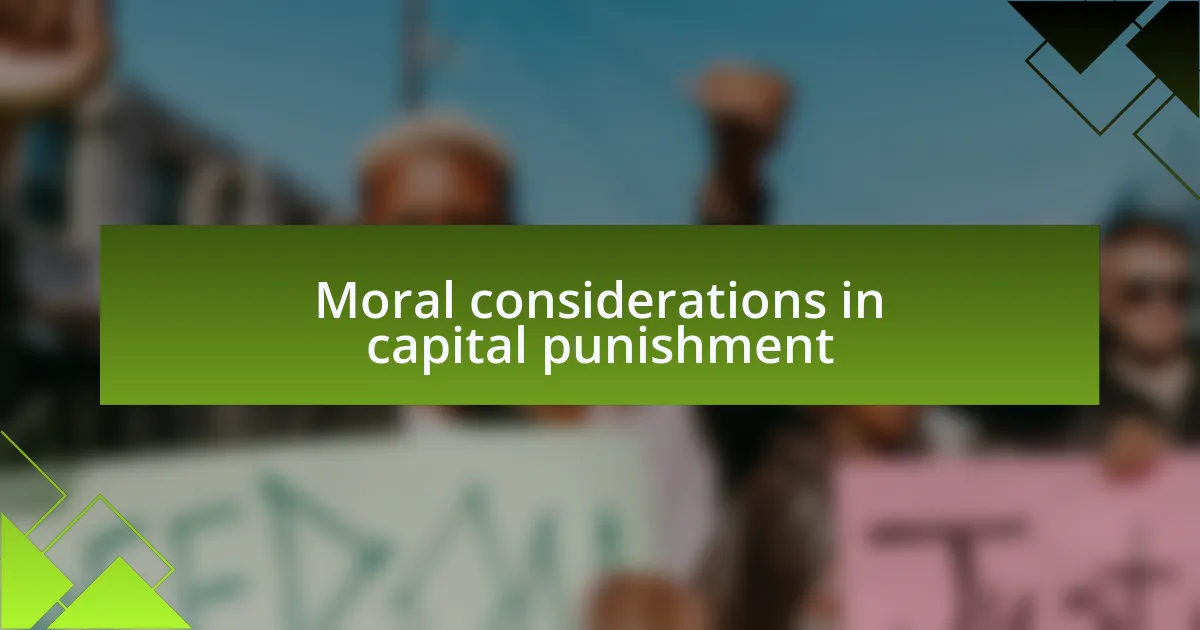
Moral considerations in capital punishment
When discussing the morality of capital punishment, one can’t help but ponder the sanctity of life itself. I once heard a poignant story from a friend whose brother was on death row. The anguish she described was palpable, highlighting not only her brother’s potential innocence but also the emotional toll on families. How can we justify a system that imposes such suffering on individuals and their loved ones, especially when the possibility of wrongful conviction looms large?
There’s also the concern of societal values reflected in the use of the death penalty. I remember a heated debate at a local university where students argued passionately about whether executing someone diminishes our humanity. It makes me wonder: Are we truly a society that values life, or do we prioritize retribution over rehabilitation? The implications of our stance on this issue resonate deeply in how we perceive justice and morality.
Furthermore, the death penalty often raises questions about the moral implications of playing God. Personally, I’ve wrestled with this idea while volunteering at a local shelter—helping those struggling with addiction and poverty. In those moments, I learned that redemption is possible, and I can’t shake the feeling that taking a life shuts down that possibility forever. So, how can we, as moral beings, decide that some lives do not deserve a chance to change?
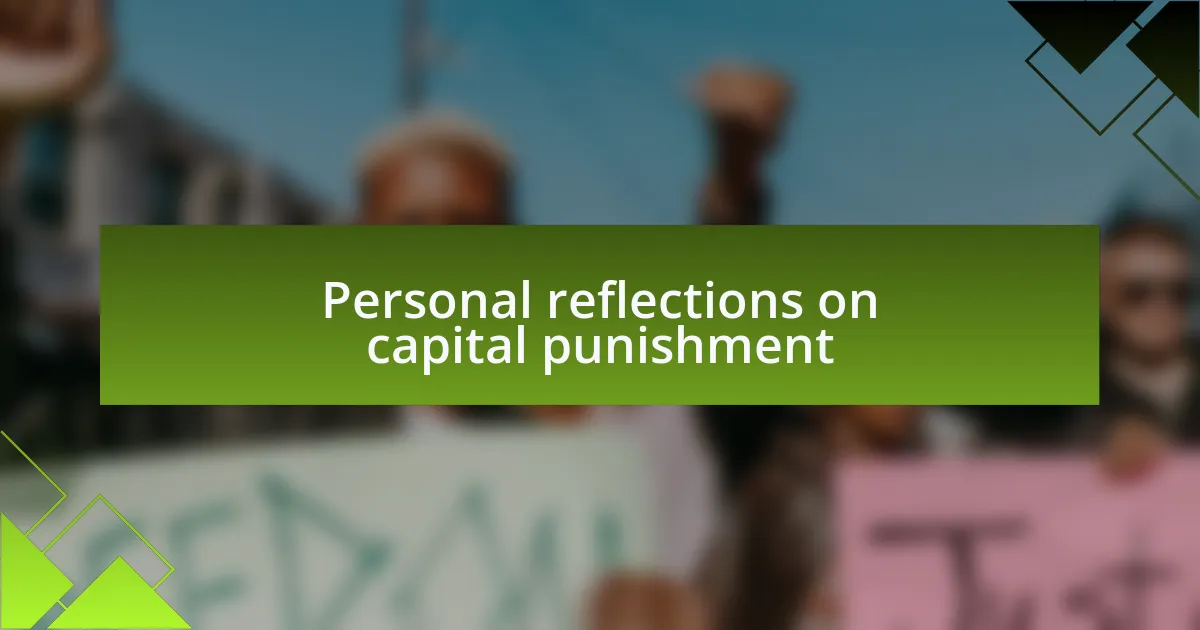
Personal reflections on capital punishment
Reflecting on the topic of capital punishment, I often find myself drawn to the stories of those who advocate against it. During a community event, I spoke with a former inmate who was exonerated after years on death row. His poignant description of the uncertainty he lived with every day made me acutely aware of how fragile our justice system can be. Can we ever justify such irreversible consequences when the possibility of mistakes hangs over us like a shadow?
Another memory that lingers with me involves a conversation with my grandmother, who lived through a time when execution was more common. She expressed a deep moral conflict about the death penalty, emphasizing how it goes against the very tenets of forgiveness and compassion she held dear. It struck me that if a person can demonstrate the capacity for forgiveness, why can’t we extend that same grace to others, even those convicted of horrendous crimes? It makes me wonder if we, as a society, are truly capable of upholding the values we claim to cherish.
Lastly, my experience working with youth in troubled neighborhoods has opened my eyes to the systemic issues that lead to crime. Many of these young people are products of their environment, facing challenges I can hardly imagine. In light of this, I find it increasingly difficult to support a system that opts for death instead of investing in rehabilitation and understanding. How can we hope to create a better future if we continue to close doors rather than open them?
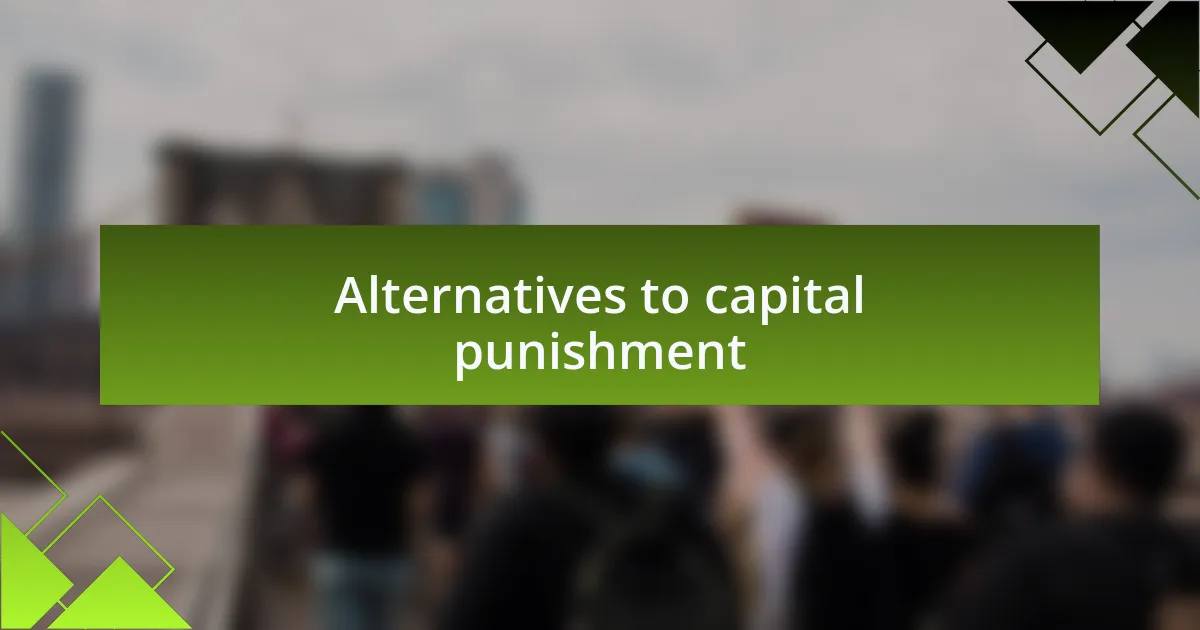
Alternatives to capital punishment
When considering alternatives to capital punishment, I often think about life imprisonment without parole. A close friend of mine once volunteered at a maximum-security prison, where she witnessed firsthand how transformative long-term incarceration can be. Many inmates, given the chance, dedicated themselves to education and personal growth, showing that change is possible even in the most dire circumstances. Isn’t it worth exploring how we can foster rehabilitation instead of ending a life?
Another alternative that resonates with me is restorative justice, which focuses on healing rather than punishment. I remember attending a workshop on this approach, where participants shared their stories about the impact of crime on their lives. It was eye-opening to see how engaging victims and offenders in dialogue fostered understanding and, importantly, accountability. Doesn’t it make sense to address the roots of crime and promote healing over simply extinguishing a life?
Furthermore, the idea of community service as a sentencing alternative has crossed my mind frequently. During my time volunteering with a community organization, I saw how empowering it could be for individuals, even those who had committed serious offenses, to give back. This not only helped repair some of the harm caused by their actions but also encouraged them to develop a stronger sense of responsibility. Isn’t community involvement a more humane way to approach justice while also making a positive impact?
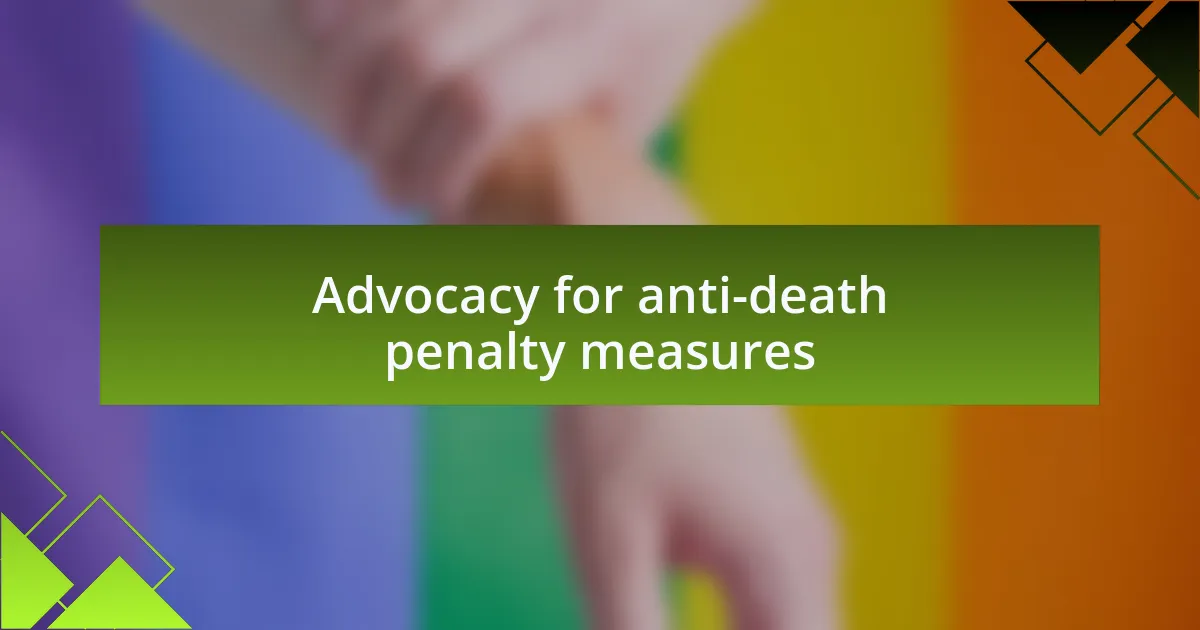
Advocacy for anti-death penalty measures
Advocating for anti-death penalty measures requires a collective effort to reshape our justice system. I remember speaking to a group of young activists who passionately shared their thoughts on how the death penalty disproportionately affects marginalized communities. Hearing their insights made me realize the systemic flaws that perpetuate inequality in capital punishment. How can we justify a system that often targets the most vulnerable among us?
As I’ve explored the stories of wrongful convictions, my heart has ached for the individuals who lost years, or even their lives, due to irreversible decisions made by the state. Watching a documentary about a man exonerated after serving decades on death row left a profound impact on me; it underscored the inherent risks involved in capital punishment. Shouldn’t our justice system prioritize the preservation of life over the possibility of an irreversible mistake?
Moreover, the financial implications of maintaining the death penalty stand out to me. During a talk on criminal justice reform, I learned that the costs associated with capital cases far exceed those of life imprisonment. This financial burden diverts resources away from critical social services that could be used to prevent crime in the first place. Isn’t it time we invested in solutions that not only promote justice but also build safer communities?